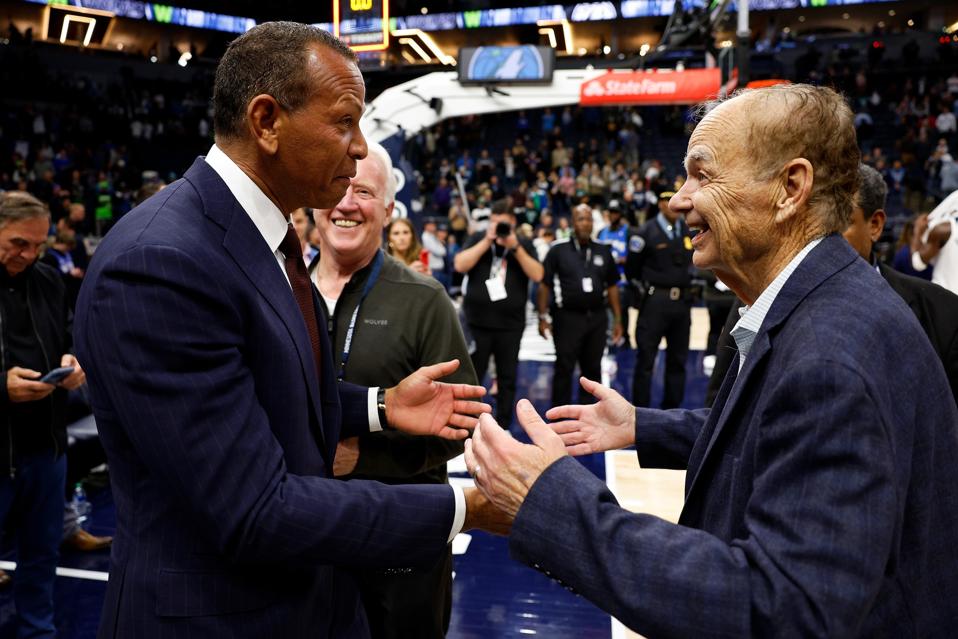Long-time Minnesota Timberwolves owner Glen Taylor announced in a press release on Thursday afternoon that he is no longer selling his controlling stake of the franchise to minority owners Marc Lore and Alex Rodriquez.
A-Rod and Lore teamed up in 2021 to start the sale process of the franchise that includes the WNBA Minnesota Lynx, along with the Timberwolves and their G-League affiliate squad — incrementally purchasing stakes of the team and now own just over 35% of the franchise.
In the press release, Taylor, who has owned the franchise since 1994, said that Lore and Rodriguez did not come up with the funds necessary to acquire the controlling interest of the team by the option expiration date of March 27th, 2024, and that “The Timberwolves and Lynx are no longer for sale.”
Lore and Rodriguez have both responded by saying that they’re disappointed by the public statement and that they “have all the necessary funding and are fully committed to closing our purchase of the team” while also saying that Taylor is having “an unfortunate case of seller’s remorse.”
The seller’s remorse part might just be true.
After all, the valuation of the franchise has increased since the $1.5 billion Taylor agreed to sell it for in 2021. Not only because NBA franchises have increased in valuation since then, with the Phoenix Suns, Dallas Mavericks, and Charlotte Hornets all selling for north of $3.5 billion — but also because the future outlook of the Timberwolves looks much better than it did in 2021.
Anthony Edwards is a full-fledged star who has brought a lot of eyeballs to the city of Minnesota and Timberwolves basketball — and the team is enjoying one of the most successful seasons in franchise history, winning more than 50 games for the 5th time since its inception back in 1989.
And Taylor’s comments to the Athletic seem to signal that he wanted to be a part of the promising future for the franchise — or at the very least — get more money for a blossoming team:
But what comes next?
There will likely be an ensuing legal battle as both sides will argue that they met and fulfilled their terms and obligations of the agreement. That could take years. But decisions are looming for the franchise (specifically monetary ones) that this halt-of-sale will impact.
Pressingly, the Timberwolves are headed towards an all-important summer financially, with Rudy Gobert, Karl-Anthony Towns, Mike Conley, Jaden McDaniels, and Naz Reid all earning about $139.7M. Five players and they are just under $2M shy of the salary cap. Not to mention, Anthony Edwards inked a massive max contract extension last summer that kicks in next season — that has the potential to go from $32.25M (25% of the cap) to $42.3M (30% of the cap) if he ends up making All-NBA this season.
The luxury-tax line is projected to be $171.3M and the Timberwolves already have a salary cap sheet of almost $180M spread across just six players. It’s likely that because of that, and as a result of their new-found success, the Timberwolves go over the NBA’s new ‘second-apron’ which severely restricts the teams’ flexibility to add players via trade or free agency. For example, the Timberwolves will no longer have access to the mid-level exception, can only sign players to minimum contracts, and can’t aggregate contracts in trades, or trade first-round picks seven years in the future.
The Timberwolves have gone into the luxury tax four times with Taylor as the owner. They were just barely over the tax in the 2019-2020 season, but before that, hadn’t paid the luxury tax since Kevin Garnett was on the roster.
Now Taylor said in the press release that he will continue to work with Lore and Rodriguez to ensure the team has the necessary resources to “compete at the highest levels” but is he willing to go the extra mile and cough up a massive, highly-restrictive luxury tax bill?
That remains to be seen. But this ordeal certainly puts a damper on one of the most successful seasons in Timberwolves history, and a cloud over a team seemingly prepping for a long playoff run.

